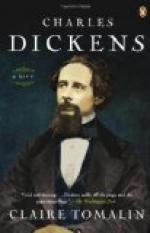[2] Mr. Langton appears to doubt whether John Dickens was not imprisoned in the King’s Bench. But this seems scarcely a point on which Dickens himself can have been mistaken.
[3] According to Mr. Langton’s dates, he would still be drawing his pay.
[4] See paper entitled “Our School.”
CHAPTER II.
Dickens cannot have been very long at Wellington House Academy, for before May, 1827, he had been at another school near Brunswick Square, and had also obtained, and quitted, some employment in the office of a solicitor in New Square, Lincoln’s Inn Fields. It seems clear, therefore, that the whole of his school life might easily be computed in months; and in May, 1827, it will be remembered, he was still but a lad of fifteen. At that date he entered the office of a second solicitor, in Gray’s Inn this time, on a salary of thirteen shillings and sixpence a week, afterwards increased to fifteen shillings. Here he remained till November, 1828, again picking up a good deal of information that cannot perhaps be regarded as strictly legal, but such as he was afterwards able to turn to admirable account. He would seem to have studied the profession exhaustively in all its branches, from the topmost Tulkinghorns and Perkers, to the lowest pettifoggers like Pell and Brass, and also to have given particular attention to the parasites of the law—the Guppys and Chucksters; and altogether to have stored his mind, as he had done at school, with a series of invaluable notes and observations. All very well, no doubt, as we look at the matter now. But then it must often have seemed to the ambitious, energetic lad, that he was wasting his time. Was he to remain for ever a lawyer’s clerk who has not the means to be an articled clerk, and who can never, therefore, aspire to become a full-blown solicitor? Was he to spend the future obscurely in the dingy purlieus of the law? His father, in whose career “something,” as Mr. Micawber would have said, had at last “turned up,” was now a reporter for the press. The son determined to be a reporter too.
He threw himself into this new career with characteristic energy. Of course a reporter is not made in a day. It takes many months of drudgery to obtain such skill in shorthand as shall enable the pen of the ready-writer to keep up with the winged words of speech, and make dots and lines that shall be readable. Dickens laboured hard to acquire the art. In the intervals of his work he made it a kind of holiday task to attend the Reading-room of the British Museum, and so remedy the defects in the literary part of his education. But the best powers of his mind were directed to “Gurney’s system of shorthand.” And in time he had his reward. He earned and justified the reputation of being one of the best reporters of his day.




